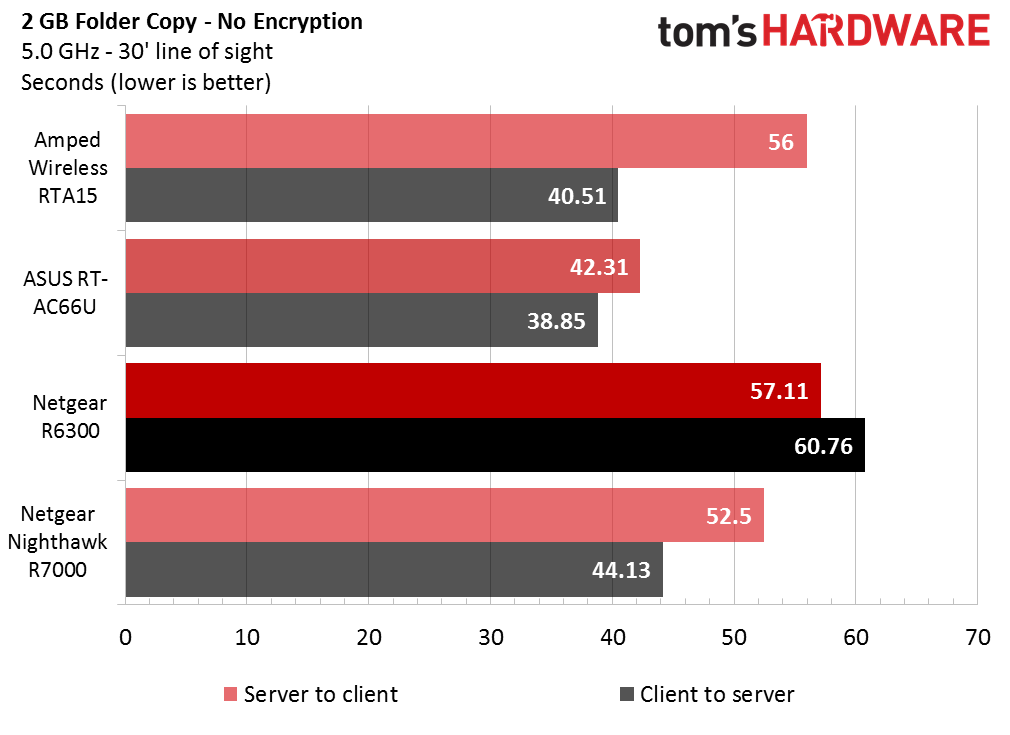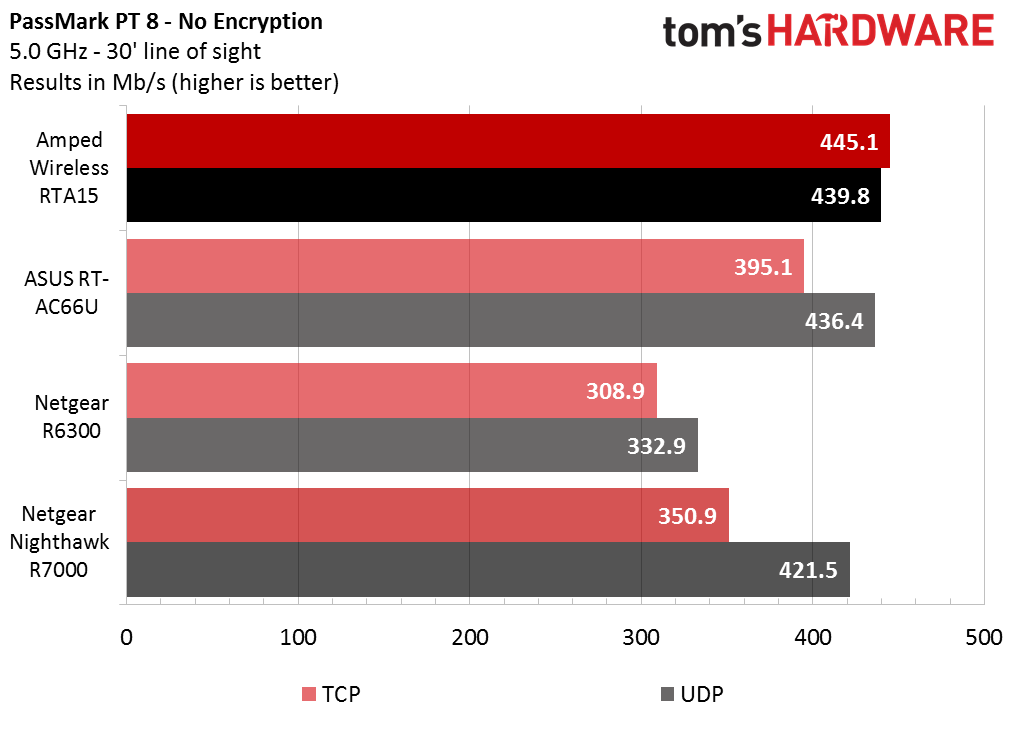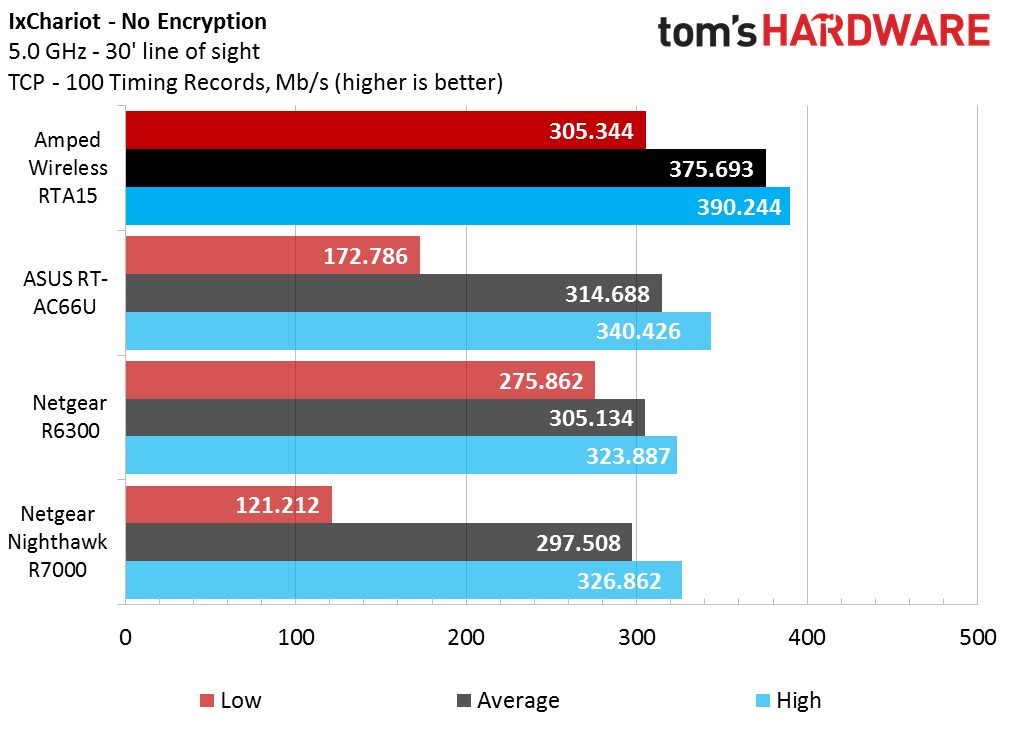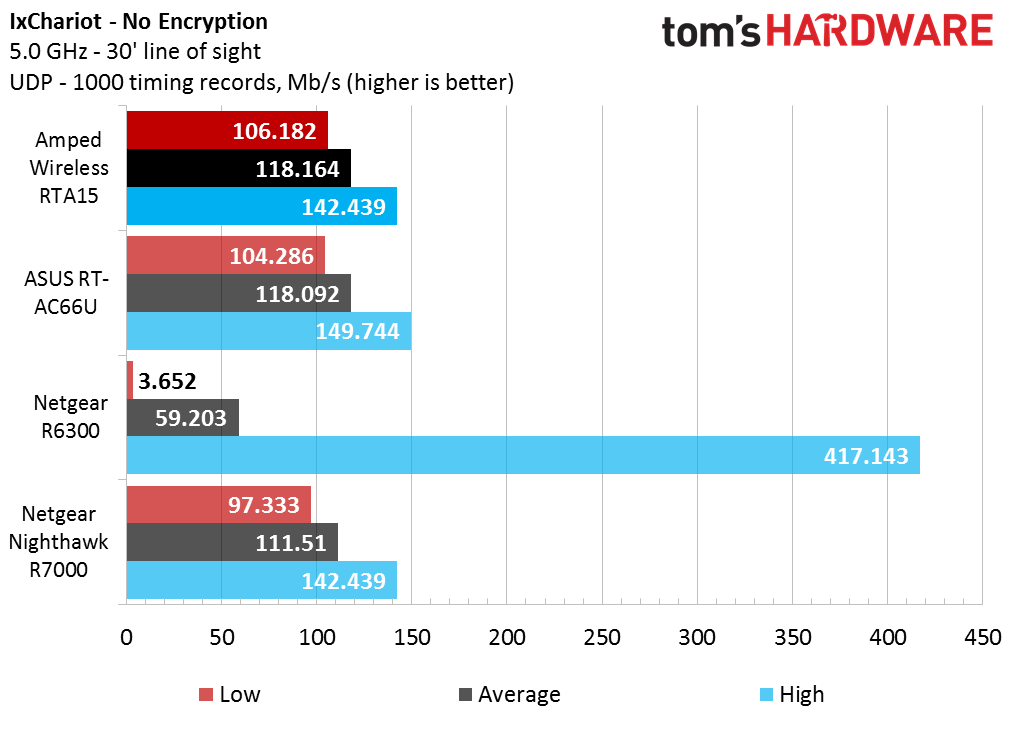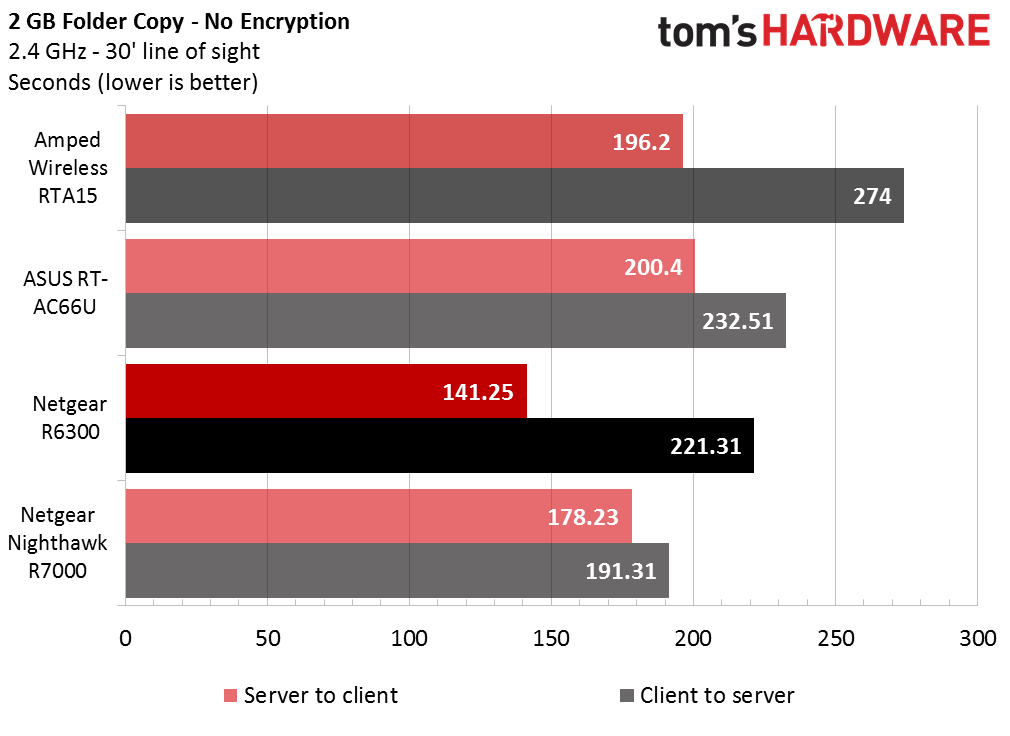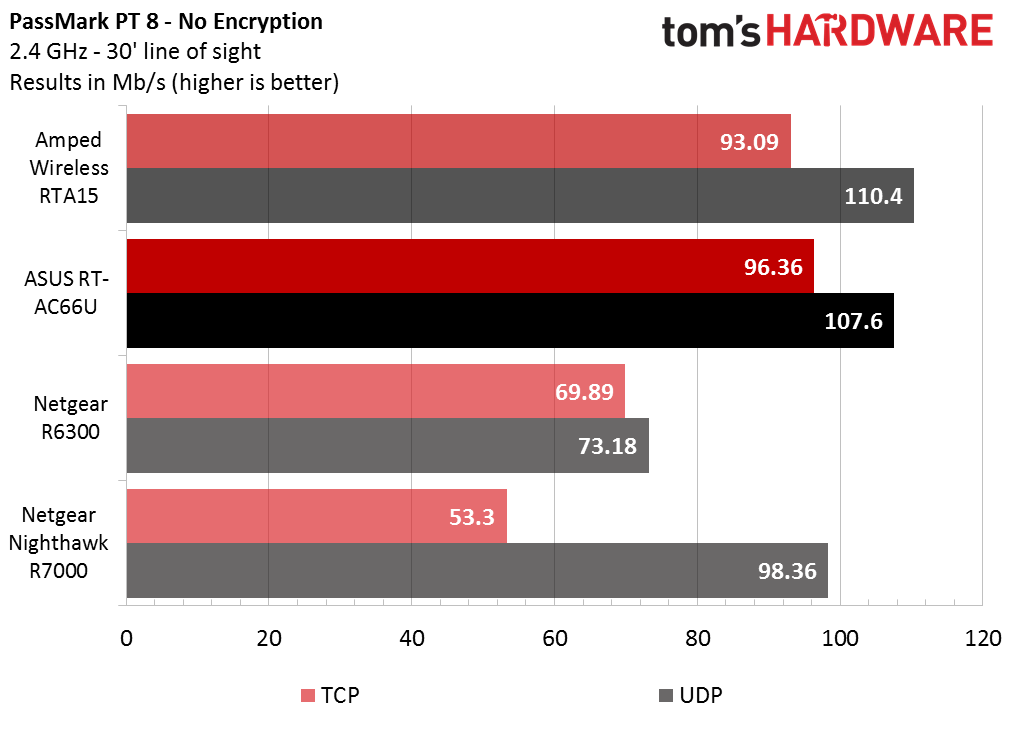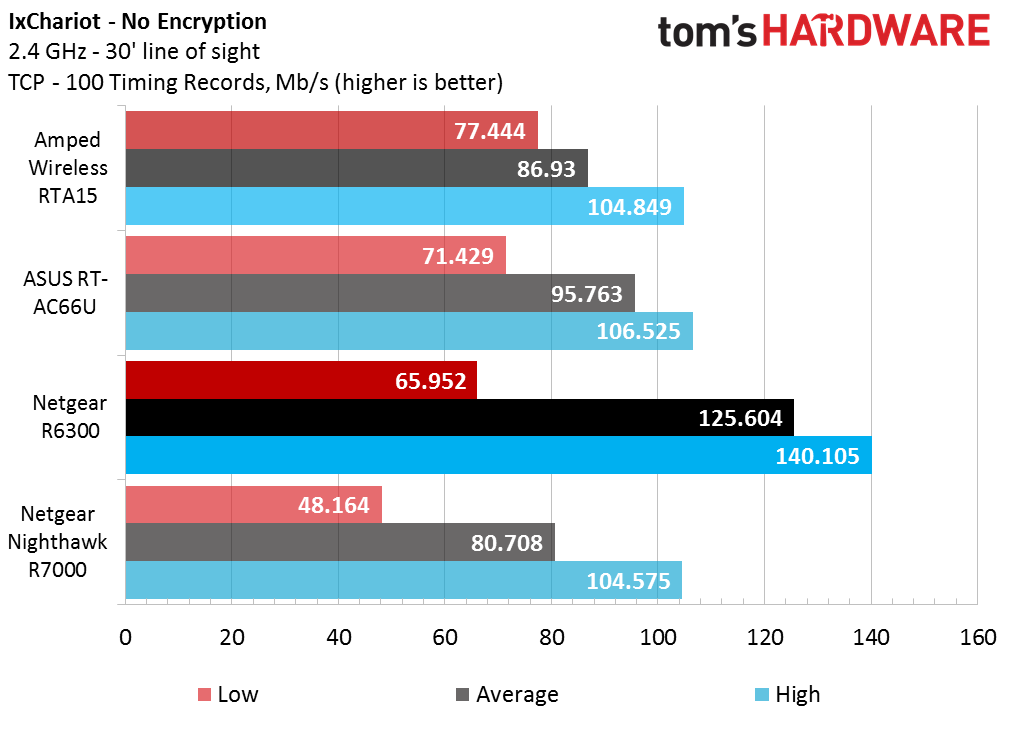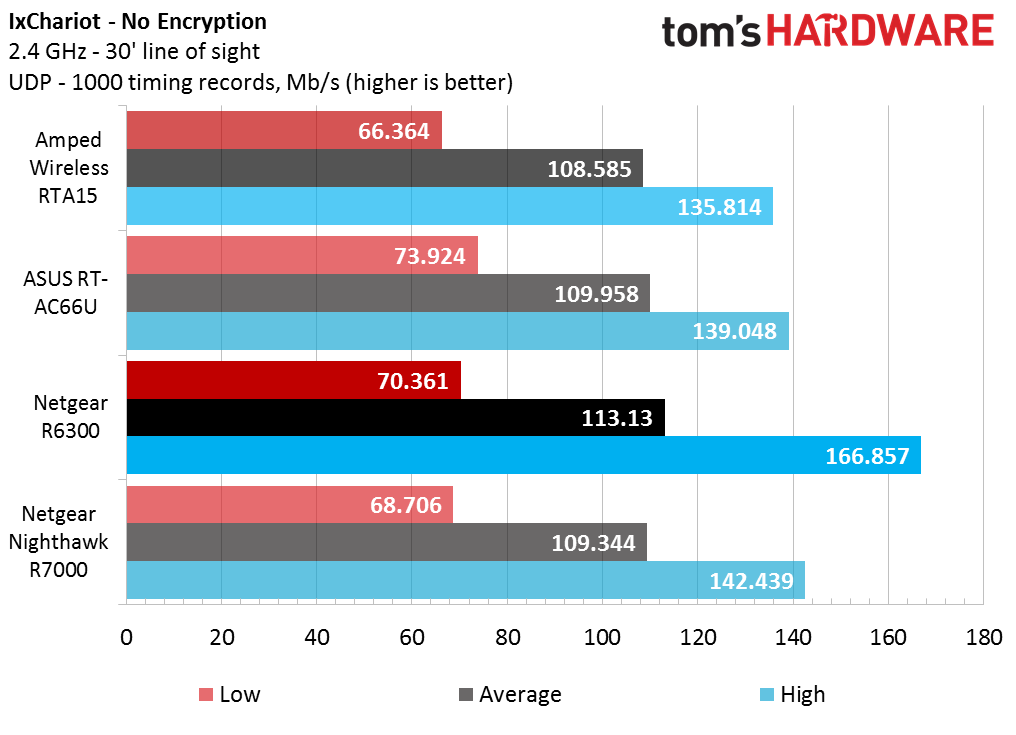802.11ac Wi-Fi Router Testing: Interference And Workloads
Performance Without Encryption
In the world of desktop CPUs, back in the days before AES-NI and similar acceleration hardware, encrypting data was a big, heavy, hairy deal. The difference between encrypting data in hardware compared to software (without hardware acceleration) was an order of magnitude or more. Similarly, routers used to suffer a performance penalty when running with encryption enabled, which led some speed fanatics to forgo encryption and run open. We wanted to see whether there was still a notable gain to be had in running unencrypted. For convenience, we’ll show the earlier encrypted results alongside their unencrypted counterparts.
The general results on our 2GB folder transfers seem to be inconsistent. Amped actually drops in performance without encryption, especially on the client to server test. Asus also nudges downward. The Nighthawk does a little give and take, but all three of these are more or less in the zone of test-to-test variances. The exception is the R6300, which takes a 10% to 20% jump. This is a strong enough leap to propel it into first place in our test. Could it be that the R6300 is in fact a far more capable speedster being held back by encryption processing? Or is it just luck and variable ambient test conditions? Let’s see...
Yup, chalk one up to luck and wobbly test factors. This time, the R6300 takes a good 10% to 20% dive without encryption. Ouch. Similarly, the Nighthawk takes a big hit on TCP performance. On the other hand, Amped and Asus both take broad jumps ahead without encryption. Feeling confused yet?
More of the same here with IxChariot’s TCP results. Three out of four average throughput results go down without encryption. Amped has the only router to show improvement—so much improvement that it went from last place to first.
Seriously, we did double-check these numbers. Asus and the Nighthawk show little UDP performance change when encryption is removed. Amped goes from exhibiting massive fluctuation to falling right in line (and actually winning the no-encryption test). The Netgear R6300 displays the exact opposite response, as if whatever madness had gripped the RTA15 with encryption suddenly jumped to the R6300 when running without encryption. It’s baffling.
Very quickly, let’s spin through the 2.4GHz encryption comparisons.
Keep in mind that we want to see lower numbers on our 2GB folder transfer. Instead, Amped and Asus actually get slower without encryption. The Nighthawk gets faster, but the R6300 gets much faster–enough to barely edge out the Nighthawk on this test.
Get Tom's Hardware's best news and in-depth reviews, straight to your inbox.
And just when you might have started to think that encryption was somehow helping throughput, this time we see eliminating it provide the gains we expected in three out of four cases. Interestingly, these same three routers primarily saw their TCP numbers rise more than their UDP without encryption. Coincidence?
Once again, three routers decline without encryption, and yes, this negates our prior thought that there might be a correlation with TCP improvement. Only the R6300 bucks the trend and gains substantially as the Amped falls from its perch.
UDP results mimic those of TCP here. The only thing remarkable we see in this last encryption chart is a strangely uniform set of results across all four routers.
All in all, it seems safe to say that there is no statistically significant penalty to be paid in applying encryption to router traffic.
Current page: Performance Without Encryption
Prev Page Baseline 2.4GHz Tests Next Page Performance With Interference-
jacobian In "How we tested" you didn't specify what kind of wi-fi hardware the test clients had. Was it PCIe or USB network adapter? What kind of MIMO setup, e.g. 3x3 or 2x2?Reply
-
chimera201 I would like to see tear-down of routers to see the components for making a guess at longevity.Reply -
CaedenV This was a much better test setup, and a really interesting read. Only complaint was that the nighthawk may have an unfair advantage in the interferance tests compared to the other units as it went up against the 66U instead of another nighthawk. Perhaps you could dig up a 5GHz N router to act as a standard interference device next time? Or find a cheap AC router? It would make it a much better apples-to-apples comparison.Reply
At any rate, great article! I will certainly send this to my more tech-savvy friends who are looking to upgrade from N right now. I have the 66U in my own home and this seems to be spot-on which what I experience relating to distance and obstructions. It is not necessarily the fastest router on the market, but it is nice an consistent which has merits. -
dgingeri Home router security is so poor, I wouldn't even think of using one. Let me guess, they all have WPS, right? HUGE security hole that nobody ha made one little tiny step in fixing, and is "featured" on nearly every home router.Reply -
Larry Litmanen I use to have constant WiFi issues, one day i went out and got the best router i could, still had issues. Calling them for support was hell, 45 minutes on the phone just to be told "Sorry sir but there's nothing wrong with our router, your internet is down".Reply
I found out that my cable/internet company provides a free router, they hooked it up..............no issues since. Heck they just gave me a free AC router that can be controlled from internet.
I will not be buying any more routers. -
@dgingeri, I've never seen a router that didn't have the option to disable WPS. And WPS is better than nothing for non-technical people.Reply
Cool article. -
dgingeri Reply15852608 said:@dgingeri, I've never seen a router that didn't have the option to disable WPS. And WPS is better than nothing for non-technical people.
Cool article.
WPS can't be turned disabled by software. That's the big problem with it. My last two routers and one AP got hacked through WPS, even though it was disabled in software. That's when I learned that it doesn't actually get turned off. The only way to protect against the WPS security hole is if the software running the router or AP doesn't support WPS. This can be done by either getting an AP or router without that feature (quite difficult and rather expensive) or putting an opensource software on your router that doesn't have support for WPS (more difficult, but somewhat less expensive.)
As for "better than nothing for non-technical people", that's pretty much asinine. That's like saying "someone can't operate the key, so we'll leave this side door open." -
dgingeri Reply15852434 said:I use to have constant WiFi issues, one day i went out and got the best router i could, still had issues. Calling them for support was hell, 45 minutes on the phone just to be told "Sorry sir but there's nothing wrong with our router, your internet is down".
I found out that my cable/internet company provides a free router, they hooked it up..............no issues since. Heck they just gave me a free AC router that can be controlled from internet.
I will not be buying any more routers.
Did you know the ISP free routers have a back door for support purposes. They couldn't support them if they didn't have that back door. The big problem with that is that every support person, and former support person, for that company knows that back door. A vengeful or malicious former employee could easily hack into any customer's router and insert tracking software or "listen in" on the internet traffic, capturing all your passwords. They also have other massive security holes. ISPs patch their router firmware for bugs or security holes even less often than home router manufacturers. They aren't safe.
-
liquidpower this is the most important part of the Client how could you not included it?ReplyIn "How we tested" you didn't specify what kind of wi-fi hardware the test clients had. Was it PCIe or USB network adapter? What kind of MIMO setup, e.g. 3x3 or 2x2?
-
bikeracer4487 So in the "Performance without Encryption" section, in the very first test you test how long it takes to copy a 2GB folder, with the results measured in seconds. The AC66U wins with the lowest time, and the R6300 having the SLOWEST time...and yet you wrote this: "The exception is the R6300, which takes a 10% to 20% jump. This is a strong enough leap to propel it into first place in our test. Could it be that the R6300 is in fact a far more capable speedster being held back by encryption processing? Or is it just luck and variable ambient test conditions?"Reply
